The Ultimate Guide to Cushion Cut Diamond Rings
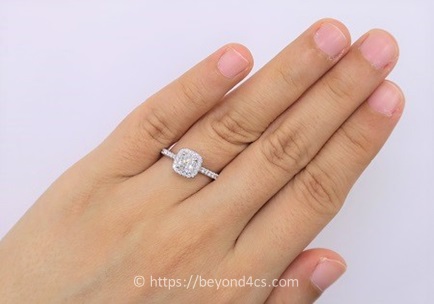
Cushion cut halo diamond engagement ring I bought. More details below…
The cushion cut (also known as the pillow cut) is a traditional diamond shape that has seen a massive resurgence in popularity recently. They typically comprise of 58-64 facets and have distinguishable curved corners which give them a classy, pillow-like appearance.
So, if you are thinking about buying a cushion cut diamond engagement ring, you have come to the right place. In this write up, you will discover the insider tips to choosing a beautiful diamond that’s full of sparkle and brilliance.
You will also find out what are the things to look out for to avoid poorly cut diamonds and the ideal proportions to help you narrow down your selections. I’m even going to show you the full details of a cushion cut halo diamond that I recently purchased.
Let’s dive in…
Here is a list of topics we will be covering:
- A Quick Historical And Technical Overview
- Different Types of Cushion Shaped Diamonds in the Modern Market
- Best Proportions For a Cushion Cut Diamond
- Length to Width Ratios For Cushion Diamonds
- How Much Does a Cushion Cut Diamond Cost?
- Recommended Color and Clarity Ratings for Cushion Diamonds
- Case Study: How I Bought a Halo Cushion Cut Engagement Ring
- Video Reviews of the Diamond Ring I Received
- Best Engagement Ring Settings For Cushion Diamonds
- Summary And Recap: Where to Buy Cushion Cut Diamonds
A Quick Historical And Technical Overview
Until the early 20th century, the cushion cut diamond was the de facto diamond shape. With its centuries of history, the cushion cut is ubiquitous when you take a look their prominent occurrences in the various royal family jewels.
If you take a look at a list of the most renowned or the largest cut gemstones, you will see that the cushion cut is surprisingly well represented. In fact, the world-famous Hope Diamond happens to be a cushion cut diamond too.
Throughout the history of the diamond industry, we had seen continually changing trends and cutting styles that had continuously evolved. Interestingly, cushion cut diamonds actually went “out-of-fashion” in the last century when the modern round cut was introduced.
It was only in recent times where the vintage cuts came back in vogue. From old European cuts to old miner cuts, these long-forgotten retro designs are finding their way back into the mainstream market today.
Different Types of Cushion Shaped Diamonds in the Modern Market
As polishing techniques and cutting styles evolved over the years, variations of the cushion cut have been developed. When shopping for diamonds, you may come across the “Cushion Modified Brilliant” which usually feature an extra row of facets on the pavilion.
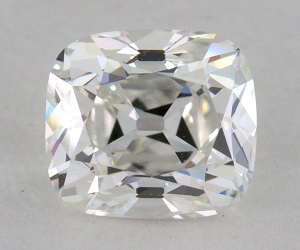
Old Miner Cuts – Vintage
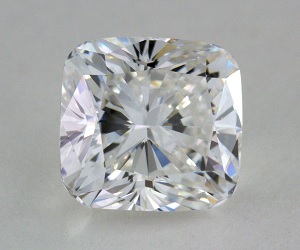
Modern Cushion Cut – Present Day
Antique cushions are popular with customers because of their romantic and classic shape appeal. Steeper crowns, smaller tables, and larger culets are all characteristic features of the vintage cushion cutting style.
On the other hand, modern day cushion cutting styles typically have small or no culets at all and take on an appearance that is closely associated with the round brilliant cut.
Instead of broad chunky facets patterning seen in older cutting styles, modern cushion cuts usually portray a more splintery looking appearance. Here’s an example of a modified cushion brilliant cut that has good light return.
Feel free to click on the image below to interact with the diamond and examine it under magnification for yourself…
Recommended Proportions for Cushion Cut Diamonds
Unlike round cut diamonds, cushion cut diamonds aren’t assigned a cut grade from GIA and this makes it harder for inexperienced shoppers to choose stones with better performance.
However, there are some specific proportions that you can use as a guide to avoiding poorly cut diamonds. You may refer to these parameters below:
| Excellent | Very Good | Good | Fair/Poor | |
|---|---|---|---|---|
| Table % | 60% – 65% | 57% – 68% | 55% – 70% | Outside Ranges |
| Depth % | 65% – 69% | 62% – 71% | 59% – 73% | Outside Ranges |
| Polish/Symmetry | Excellent – Very Good | Good | Outside Ranges | |
| Length to Width | 1.00 – 1.05 | 1.06 – 1.20 | 1.21 – 1.35 | Outside Ranges |
| Girdle Thickness | Thin – Slightly Thick | V. Thin – Thick | Outside Ranges | |
| Culet Size | None | Very Small | Small | Outside Ranges |
* Note: The proportions table is meant as a general guideline for people who are buying blind. If you can see the diamond in person or via videos, that will always take precedence instead of trying to judge a fancy cut based on numbers. I also highly recommend that you use an ASET scope to check for optical performance and use this knowledge to help you make better decisions.
From experience, well cut cushion diamonds with better fire and brilliance tend to have depth ratios between 65-69% and table sizes between 60-65%. These numbers are much higher compared to those of round diamonds and that’s perfectly fine because of the intrinsic facet structure of cushions.
To give you a better idea of the kind of diamonds that you should look out for in terms of cut quality, here are 2 examples of cushion cut diamonds with superb light performance and contrast patterning. For more real-life examples of poorly cut and well cut comparisons of diamonds, click this link.
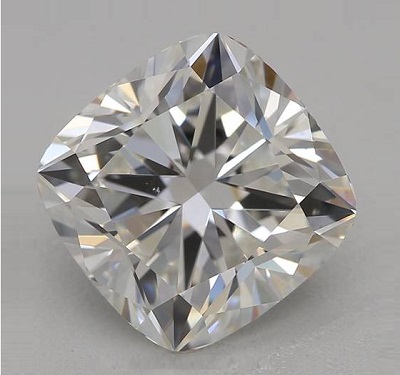
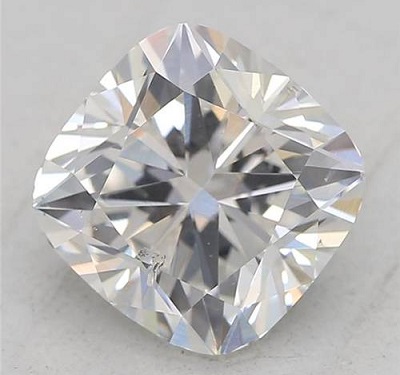
How Much Does a Cushion Cut Diamond Cost?
Compared to round cut diamonds, the price of cushion diamonds are generally 20-30% lower and this means you get better mileage for your buck. Depending on the specific quality of the diamond (i.e. 4Cs), prices can vary significantly. Check out the price table below…
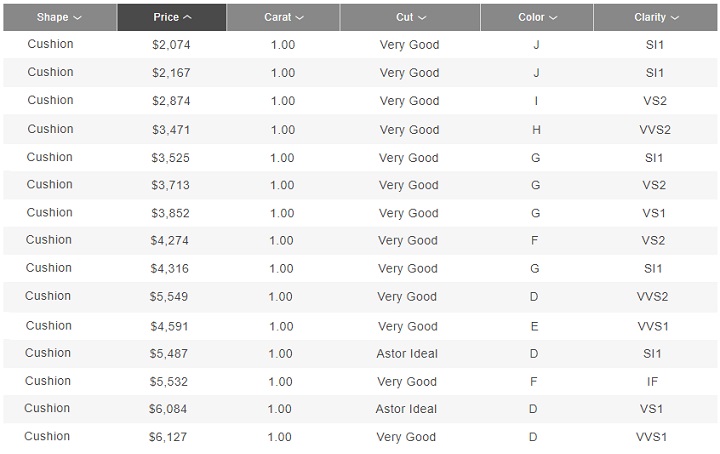
Price chart comparison of GIA certified 1ct cushion diamonds.
From the table above, you can easily discern that a diamond with better specifications in color/clarity would cost more. And the price increases in an exponential manner when you get to the higher tiers of clarity and color grades.
But here’s the thing.
Diamonds are priced according to their material properties and you don’t require a D/IF rating to get a beautiful looking diamond. If you are on a budget or don’t need the symbolic meaning of a D/IF grade, you can save a lot of money with a lower color/clarity diamond which can look just as good.
Length to Width Ratios for Cushion Cuts
Cushion brilliant cuts can exist in a variety of shapes ranging from squarish to rectangular shapes. This is largely a matter of personal preference and also dependent on the type of ring setting to be used.
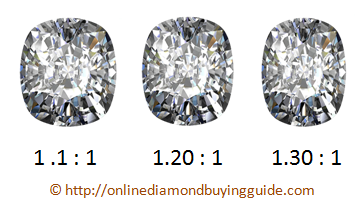
The most popular l/w ratios for a cushion cut lie between 1.00 to 1.05 where the diamond takes on a squarish looking appearance. If you are someone who likes a more traditional appearance, stick with ratios close to 1:1.
Recommended Clarity And Color Ratings for Cushion Diamonds
When it comes to color and clarity grades, you need to understand that it is entirely up to personal preference on what you prefer. Speaking from a practical perspective, eyecleanliness is the most important thing I look out for when buying a diamond.
For cushion cut diamonds, the majority of VS2 and SI1 diamonds will be eyeclean and have their inclusions masked by the sparkle and scintillation of the diamond. The caveat here is that the diamond MUST be well cut and that you utilize a video listing to check how the inclusions look like.
To illustrate this, I want you to click on the following images and check out these 2 SI1 diamonds graded by GIA. With the interactive videos, can you tell which would be the better diamond to get?
Video listings from James Allen easily reveal the eyecleanliness of SI1 diamonds.
As for color, I recommend at least a G color for people who are color averse and are looking for an icy white appearance. Again, I want to stress that the choice of G color is largely subjective. If you like warmer tones or yellow colored settings, lower color grades like J or K would be perfectly OK for you.
Speaking from experience, most people who buy cushion cut diamonds actually prefer warmer colors over cool colors. The most popular ratings that people buy cushion cuts in are G, H and I colors.
Case Study: How I Bought a Halo Cushion Cut Engagement Ring
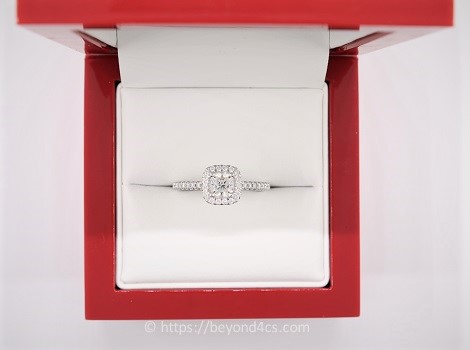
Buying cushions can be a tricky affair due to the lack of cut information that you can obtain from the grading report. You see, when it comes to fancy cuts, 2 diamonds with the same depth/table proportions can look totally different from each other.
That’s why it’s extremely important to have factual information like videos or ASET scope data to help you assess the diamond. I’ve recently purchased a cushion cut halo diamond ring from James Allen and the shopping process is very straightforward.
Using James Allen’s video technology, I could easily cherry-pick the BEST diamond in terms of light performance out of 100s of available options. I ended up with the 0.52ct E color VS1 cushion cut diamond below.
To complete the ring, I selected a pave setting design with a halo to enhance the overall bling factor of the ring. The choice of metal was 14k white gold for practical reasons; lower costs and higher durability.
Video Reviews of the Cushion Cut Diamond Ring I Received
Separately, I’ve made 2 videos to showcase the craftsmanship of the engagement ring and how the diamond looks in real life. If you want to see how the cut quality of the diamond translates into real life sparkle and brilliance, make sure you watch them in full below!
Best Engagement Ring Settings For Cushion Diamonds
Classic and versatile, the cushion cut diamond looks good in many different types of setting designs. Whether it is set as a solitaire or mounted in a halo setting, there are plenty of great looking designs to pick from. Here are some of my favorite designs…
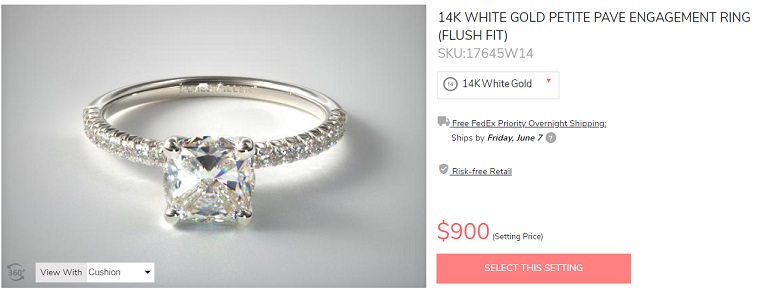
The thin shank is studded with melee diamonds which accentuate center stone and increases the sparkle factor.
This luxurious design features a split shank and halo to add multiple dimensions of brilliance.
A simple and evergreen 4 prong solitaire ring design that showcases the classic appearance of the cushion cut.
A beautifully crafted platinum ring that showcases a reverse split shank with melee diamonds.
If you want to look at more designs, head over to Blue Nile and James Allen to explore their extensive selection of cushion cut engagement rings. There are more than a hundred ring settings that include romantic, antique inspired designs and classic solitaires to choose from!
Summary: Where to Buy Cushion Cut Diamond Rings
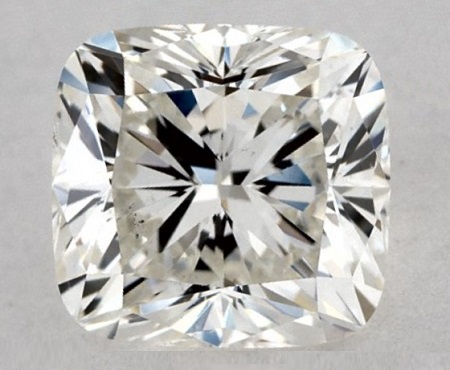
A modern 1 carat cushion modified brilliant diamond.
To recap, here are my recommended guidelines for buying a cushion cut diamond:
Depth: 65% to 69%
Table: 60% to 65%
Polish/Symmetry: Very Good or Excellent
Length to Width Ratio: Within a range of 1.00 to 1.05
Color: G or better
Clarity: SI1 or better
Just like other fancy shape diamonds, the proportions and parameters are just a tool to help you weed out poorly cut diamonds. And as I said before, there is no guarantee you will get a great looking stone even if the “statistics” on a grading report look promising.
Nothing on a certificate would tell you whether the cushion diamond has a vintage appearance or a crushed ice appearance. The certificate also can’t tell you if the shape is off. Ultimately, you will need to rely on visual data like videos to help you make the final selection.
Now, in my opinion, physical retailers are some of the worst places to shop for a cushion cut diamond ring because of their limited inventory and poor curation standards. With fancy shapes, you need a larger pool of selections to cherry pick from and that is something that only the online retailers can provide.
With cushion shape diamonds, the best places to buy your engagement ring would be Blue Nile and James Allen. Both are highly reputable and offer HD videos that allow you to inspect your diamond upclose. More importantly, they have excellent risk-free sales policies and provide a superb selection of GIA and AGS graded diamonds.
I hope this article has helped and if you have any questions or need a second opinion on a diamond, feel free to leave a note below or get in touch via email. Good luck!
Related Articles
Leave A Comment

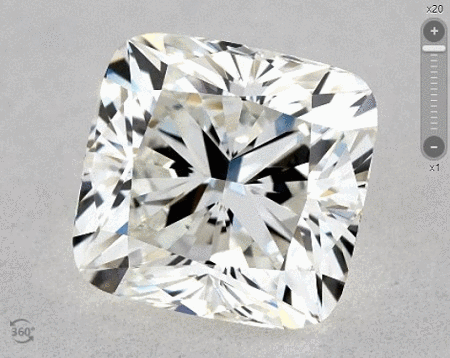
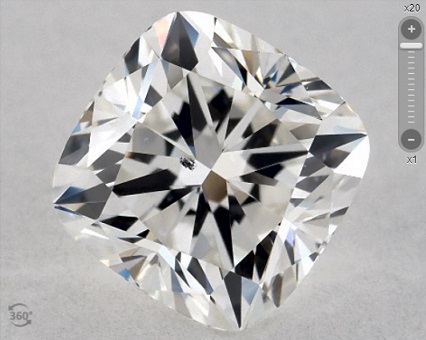
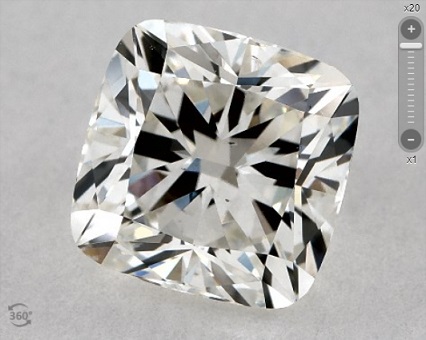
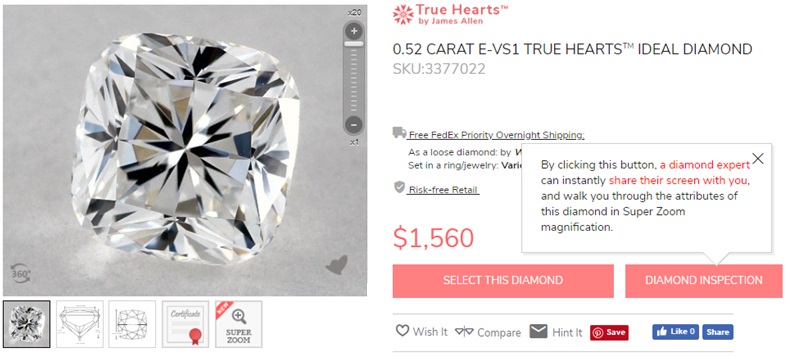
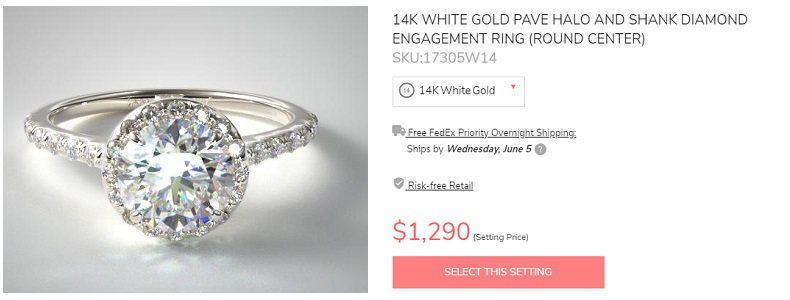
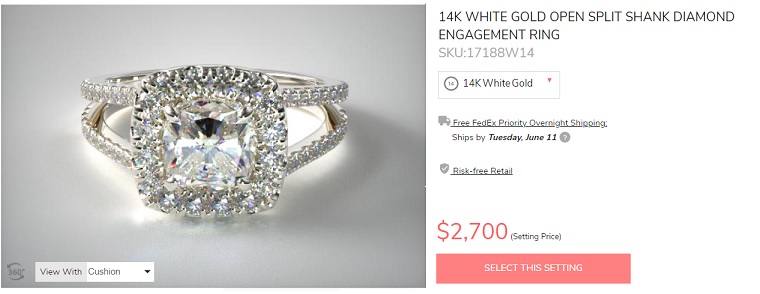
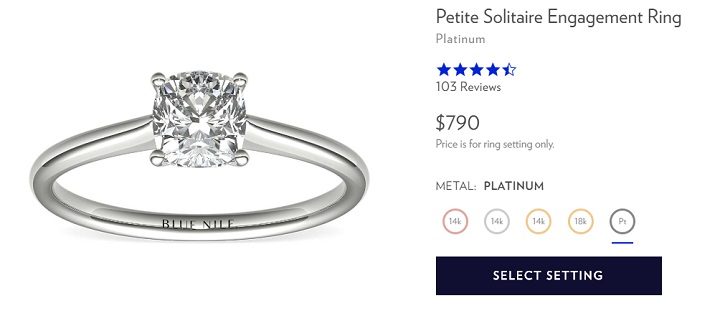
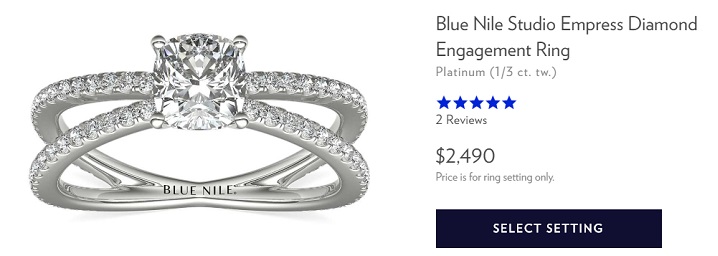
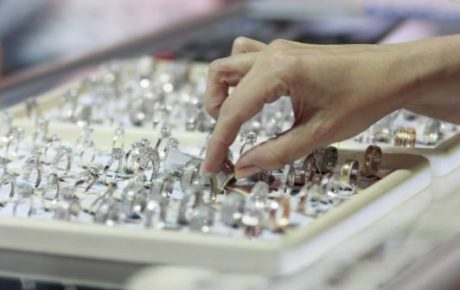

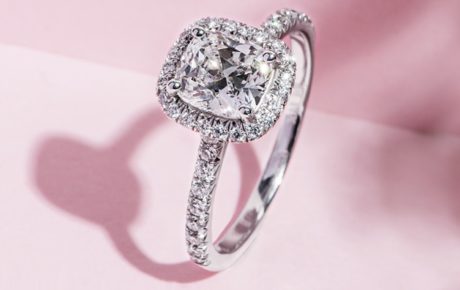
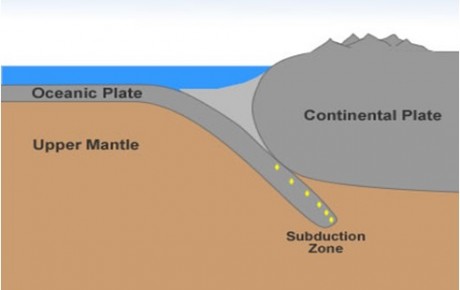






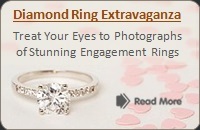
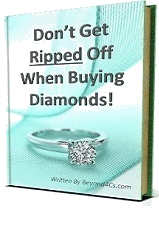

23 Comments
What’s the difference between radiant vs cushion diamonds? They both look similar to me. What’s the best color for a cushion cut diamond in a platinum setting with F/G melees?
This page answers your question: https://beyond4cs.com/faq/radiant-vs-cushion-cut/
The best color for a cushion cut diamond is subjective. If you are color adverse, I would recommend a G and it will match the setting nicely.
Thanks for the time you’ve taken in putting this website together Paul – I really think it’s the most informative, unbiased and helpful website on the internet for anyone looking to buy a diamond. Thanks again, Phil
I’m looking for an antique cushion cut loose diamond. Do you have any information or guides published on those specific cushion designs? One eBay vendor has a listing that includes a video to the stone but it is graded by EGL International and from what I researched so far, the lab doesn’t seem reputable. Would you be able to look at the listing and offer advice on it?
J.E.
The antique/vintage cutting style you are referring to is called Old Miner Cut (OMC) and it is sometimes called the candlelight diamond. I actually wrote a fairly recent guide on these stones here: https://beyond4cs.com/shapes/cushion/old-mine-cut/
EGL International is not a gemological laboratory I would recommend. They are pretty notorious for lax grading standards. This is to the extent that the largest trading network, Rapaport, had banned all EGL listings from their database. If there are specific stones that you need a second opinion on, feel free to drop me a private email.
Thank you for your hard work on this site. Thanks to your input on ASET imaging and it’s importance for fancy cut stones (such as the cushion I intend on buying) you saved me from a potentially expensive mistake.
https://www.jamesallen.com/mobile/loose-diamonds/cushion-cut/1.21-carat-e-color-vvs1-clarity-sku-757487
I have been looking for a cushion cut diamond of fairly high quality. I’m trying to target the 1.2-1.6 size range and a price tag of around 10k. What should that get me in terms of quality? And does this strike you as a good example of one? What might be your suggestion of similar stones?
Thanks!
This is a well cut crushed ice cushion diamond.
What is a crushed ice diamond?
It refers to the scintillation patterning of the cushion diamond. This should help: https://beyond4cs.com/shapes/cushion/broad-flash-or-pinfire/
https://www.jamesallen.com/mobile/loose-diamonds/cushion-cut/1.71-carat-f-color-vs1-clarity-sku-1045032
There is a small inclusion in the table, but this looks like a beautiful diamond for the price and the dimensions fall within the very good/excellent range. Is this one a good value?
The inclusion is not an issue. I can assure you that the diamond is eyeclean. Use this to test: https://beyond4cs.com/clarity/resize-technique/
Thank you for this guide. It is extremely helpful. It is definitely not easy picking the right diamond. What is your opinion on the brilliance of these three diamonds from James Allen? I am trying to decide whether I should request the ASET or wait for more diamonds.
https://www.jamesallen.com/loose-diamonds/cushion-cut/1.51-carat-h-color-vvs2-clarity-sku-1836466
https://www.jamesallen.com/loose-diamonds/cushion-cut/1.51-carat-g-color-vs2-clarity-sku-1817313
https://www.jamesallen.com/loose-diamonds/cushion-cut/1.51-carat-h-color-vs2-clarity-sku-1860361
Hi Paul, I appreciate the website you have put together as it has provided a lot of good information to consider in the diamond selection process. On one of your pages, you said you would help with a short list of appropriate diamonds with provided specifications. I have perused the online vendor you recommended, and have found it to provide a great selection.
Now full disclosure on my selection process, I am still looking at local vendors as well. I have been to a few and all except one has fallen in to a lot of pitfalls that you have described (not willing to do extra tests like ASET and HCA, only allowing diamonds viewed indoors). There is one place I am considering if i were to go local. I looked at a few cushion cut diamonds with them and they allowed me to take them outdoors and look at them in the parking lot and have agreed to do ASET and HCA evaluations on the diamonds I am considering with them and I am currently awaiting those results. With the vendor they said (and I have seen comments from your site) not to put excessive stock in the HCA score. My question is, does the relevance of the HCA score make a difference if you are considering a cushion cut diamond vs say a round cut.
If I chose online I want to see what diamonds you would recommend, as this route is something I am strongly considering as it seems it will provide great peace of mind that I am making the perfect choice. Currently my budget for stone alone is between 10-12 thousand and I am looking solely for a cushion cut stone. The color range I am looking for is a G or lower and for Inclusions SI1 or better. Carat size i have been looking at within this range has been around 1.50-1.60. Any guidance you could provide regarding a diamond with these specifications or if you think I should modify my expectations for any of these categories would be greatly appreciated!
The HCA tool is not meant for fancy shaped diamonds like cushions.
https://beyond4cs.com/grading/aset-reference-charts/
With cushion cuts, vendors like ED have a very good curated inventory of well cut cushions. And it is very very unlikely you will be able to find diamonds locally that comes even close to these diamonds in terms of performance (better price point is a side benefit).
SKU C160-1981Z83Z9
SKU C152-63Z96Z635
SKU C150-103209Z95
All 3 diamonds are exceptionally well cut for light performance and are eyeclean. I have a strong preference for the 1st stone because of the good value it provides.
Hi Paul, thank you for sharing your experience and knowledge, it has been helpful, but I have even more questions..
I am going through the painful process of shopping for a fancy cut stone, specifically elongated cushion brilliant cut. I currently purchased a lab created stone “blind” from BrilliantEarth and I am not fully satisfied (fortunately I have about 30 days to return/exchange). This blind purchase has put me in a bit of a panic, which lead me to do more research and I realized I do not like the cushion modified cut which creates the very tiny random appearing facets. I prefer the “chunkier” cushion brilliant which it’s larger facets.
You’ve recommended specific retailers on your site for natural cushion cut stones, but do you have any recommendations shopping for a lab-created stones?
thanks!
With lab created diamonds, Brilliant Earth is still the best place to shop and they hold the largest inventory of stones for you to cherry pick from. Fundamentally, there’s nothing wrong with Brilliant Earth. It’s the way that you shop that needs to be changed. When buying fancy shape diamonds like cushion cuts, you need to SEE videos and you can filter out those WITH video listings at Brilliant Earth instead of shopping for one based on a grading report.
James Allen is another vendor that offers video listings that enable you to view how the cushion cut looks like before you buy. Go here and you will find that it’s much easier to shop in this manner with certainty.
Thank you for your response. I just now noticed your review on BE, helpful.
The stones I wish to look at from BE do not have any video images, I have made a request for both video and ASETs, but that is pending.
I do have an upcoming appointment in their La showroom to view another stone and plan on bringing a 10x loop and an ASET scope to see the stones for myself.
The C’s are important to me but I am willing to sacrifice some C’s to get the size (approx 9mm X 8mm) as long as the stone is “eye clean” and “fiery” all while staying in my budget of 15k.
Current stone: 2.59 IF, E color, excellent polish/symmetry, table 66%, depth 60.4%, medium-slightly thick girdle.
I admit I am shopping “blind” using only IGI certification, but I hope with my 50 min appointment I will be able to evaluate the stones and deicide if I like the stones enough to commit to a purchase. Do you have any other advice for this in person approach?
If you are going in with an ASET tool and seeing the diamonds in person, then it would be fine. Here’s a reference chart for you to refer to: https://beyond4cs.com/grading/aset-reference-charts/
Just make sure you compare the diamonds in different lighting environment instead of the “default” spotlight environment. Get them to close the spotlight and turn up a fluorescent lighting to view the diamonds. Also, consider bringing the diamonds beside the windows to look at them under daylight.
In regards to cut quality. I’m in the market for a cushion with a large L/w ratio (something like 1.15-1.30). Given the elongated shape of the cushion, is it likely to find one that has high cut quality? Will longer cushions have the same brilliance as more square or do I just need to accept that the shape is gonna change the reflections a lot.
Elongated cushions tend to be leaky due to the intrinsic nature of their cutting style. If you want a cushion cut with stronger light performance, stick with squarish outlines. That said, there are still well cut elongated cushions but you will need to filter and select them very carefully.
Hi Paul,
Wish I saw your tips before I paid for my ring. I got a cushion halo. But my stone has thick to extreme thick girdle. Now it sits really tall on the halo. The jeweler can’t set it lower because the thick girdle. Any advise what I can do next?
Thanks!
If there is a return period still available, then return the ring and start afresh. If you are stuck with the ring, then you really need to talk to your jeweler or find another one to custom make a setting to suit the diamond. Without seeing the diamond in person, I do suspect that this is more of an issue with the setting (probably casted) and that a properly customized setting should be able to resolve your issues.